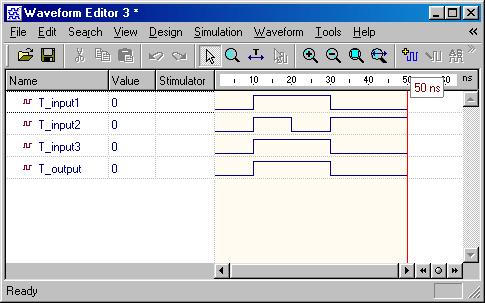Combinational Logic Design
Behavioral Code:
library ieee; -- component #1
use ieee.std_logic_1164.all;
entity OR_GATE is
port( X: in std_logic;
Y: in std_logic;
F2: out std_logic
);
end OR_GATE;
architecture behv of OR_GATE is
begin
process(X,Y)
begin
F2 <= X or Y; -- behavior des.
end process;
end behv;
-------------------------------------------------------------
library ieee; -- component #2
use ieee.std_logic_1164.all;
entity AND_GATE is
port( A: in std_logic;
B: in std_logic;
F1: out std_logic
);
end AND_GATE;
architecture behv of AND_GATE is
begin
process(A,B)
begin
F1 <= A and B; -- behavior des.
end process;
end behv;
--------------------------------------------------------------
library ieee; -- top level circuit
use ieee.std_logic_1164.all;
use work.all;
entity comb_ckt is
port( input1: in std_logic;
input2: in std_logic;
input3: in std_logic;
output: out std_logic
);
end comb_ckt;
architecture struct of comb_ckt is
component AND_GATE is -- as entity of AND_GATE
port( A: in std_logic;
B: in std_logic;
F1: out std_logic
);
end component;
component OR_GATE is -- as entity of OR_GATE
port( X: in std_logic;
Y: in std_logic;
F2: out std_logic
);
end component;
signal wire: std_logic; -- signal just like wire
begin
-- use sign "=>" to clarify the pin mapping
Gate1: AND_GATE port map (A=>input1, B=>input2, F1=>wire);
Gate2: OR_GATE port map (X=>wire, Y=>input3, F2=>output);
end struct;
----------------------------------------------------------------
Test Bench for comb_ckt.vhd:
--------------------------------------------------------------------
library IEEE;
use IEEE.std_logic_1164.all;
use IEEE.std_logic_arith.all;
entity CKT_TB is -- empty entity
end CKT_TB;
-------------------------------------------------------------------
architecture TB of CKT_TB is
-- declare the whole circuit(entity of comb_ckt.vhd) as a component
component comb_ckt is
port( input1: in std_logic;
input2: in std_logic;
input3: in std_logic;
output: out std_logic
);
end component;
-- declare all I/O ports from unit under test as signals.
-- signals are usually declared within architecture
signal T_input1, T_input2, T_input3, T_output: std_logic;
begin
U_UT: comb_ckt port map (T_input1,T_input2,T_input3,T_output);
process
variable err_cnt: integer := 0;
begin
-- Test case 1
T_input1 <= '0';
T_input2 <= '0';
T_input3 <= '0';
wait for 10 ns;
assert (T_output=((T_input1 or T_input2) and T_input3))
report "Failed Case1!" severity error;
if (T_output/=((T_input1 or T_input2) and T_input3)) then
err_cnt := err_cnt +1;
end if;
-- Test case 2
T_input1 <= '1';
T_input2 <= '1';
T_input3 <= '1';
wait for 10 ns;
assert (T_output=((T_input1 or T_input2) and T_input3))
report "Failed Case1!" severity error;
if (T_output/=((T_input1 or T_input2) and T_input3)) then
err_cnt := err_cnt +1;
end if;
-- Test case 3
T_input1 <= '1';
T_input2 <= '0';
T_input3 <= '1';
wait for 10 ns;
assert (T_output=((T_input1 or T_input2) and T_input3))
report "Failed Case1!" severity error;
if (T_output/=((T_input1 or T_input2) and T_input3)) then
err_cnt := err_cnt +1;
end if;
-- Test case 4
T_input1 <= '0';
T_input2 <= '1';
T_input3 <= '0';
wait for 10 ns;
assert (T_output=((T_input1 or T_input2) and T_input3))
report "Failed Case1!" severity error;
if (T_output/=((T_input1 or T_input2) and T_input3)) then
err_cnt := err_cnt +1;
end if;
-- summary of all the tests to see if any errors
if (err_cnt=0) then
assert false report "Testbench completed successfully!"
severity note;
else
assert true
report "Something wrong, try again pls!"
severity error;
end if;
wait; -- stop running
end process;
end TB;
-------------------------------------------------------------------
configuration CFG_TB of CKT_TB is
for TB
end for;
end CFG_TB;
--------------------------------------------------------------
Behavior Simulation:
Synthesis Schematic:
Gate-level Simulation:













very helpfull sir